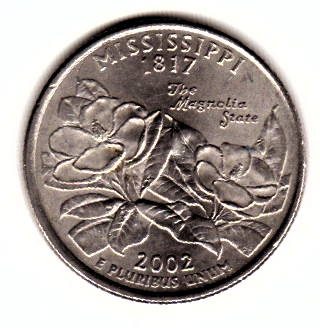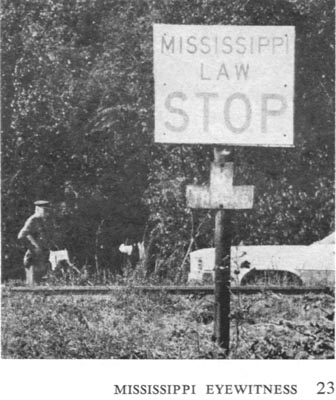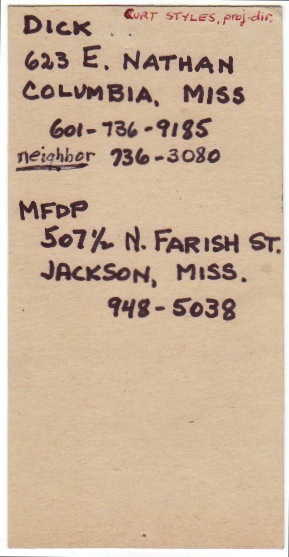Letters from Mississippi -- Fall 1964 and Summer 1965
Originally posted: Spring-Summer, 2013
Latest update: 30 September 2020
Site updated: 29 May 2019
(
Home <
Issues
)
Printable PDF
 |
 "Make them live in a valley of fear . . . a valley guarded by our men who will both be their only hope and the source of their fear" Adolph Hitler, 1939 * |
 |
|
| "Mississippi Law:" an oxymoron of law enforcement violating rights, a stereotyped southern phenomenon then, but increasingly ubiquitous now, in the actions of militarized local police and the "anti-terrorist" Dept. of Justice (quotation and picture: Ramparts Magazine's stunning "Mississippi Eyewitness") |
|||
Background
|
I was in my sophomore year at the University of Chicago in the fall of 1964, when Heather Tobis (later the remarkable Heather Booth) came to the university to recruit students to go south to Mississippi.
A brief bit of background -- In 1963, the Student Nonviolent Coordinating Committee (SNCC) and the umbrella Council of Federated Organizations (COFO) had been working on black voter registration, but ran into severe opposition, with the Federal government backing away from providing support. So they got almost 30,000 unregistered black people to show up for the August gubernatorial primary with legal provisional ballots. These ballots were all disqualified or thrown out, accompanied by violence. So SNCC and COFO decided to run a separate, symbolic election that fall for the disenfranchised blacks -- the Freedom Vote -- to expose the illegality of what was happening. Amid continued violence, local black organizers and northern white volunteers fanned out everywhere and collected ballots from a fifth of the black voting age population. The election didn't elect anyone, but it was a tremendous symbolic success, and it formed the basis for organizing the Mississippi Freedom Democratic Party (MFDP). The next summer -- the legendary Freedom Summer of 1964 -- the activists continued local MFDP party organizing, again against massive and this-time-well-documented violence. It elected delegates to the Democratic National Convention, to be seated in place of the illegally-constituted regular Democratic delegation from Mississippi. In the end this effort was blocked by a Lyndon Johnson afraid to lose the Southern vote. So the goal that fall was instead to get black Mississippians to vote in a reprise of the previous year's Freedom Vote, again staffed by southern blacks (SNCC/COFO/MFDP) and northern whites, including me. The election was not only a contest between Barry Goldwater and Lyndon Johnson, but also between the regular party candidates and the MFDP's own candidates. (Ironically, in spite of his role in snuffing the MFDP delegation, I found Johnson to be liked by most of the ordinary people I encountered in the black communities in which I worked that fall, because of his connection to the idolized JFK.) The white hats -- Although the black civil rights movement in the 1950's and early 1960's had been making huge strides on its own, these strides and the associated violence weren't getting the kind of steady high-visibility profile in the rest of the country and government that the use of whites could bring -- particularly if there were the kind of violence and murders that were so often ignored by the press when black activisits were involved. In many ways, the black activists made it clear at the orientations I experienced that they would have much rather continued work on their own. Many, perhaps most, of the northern whites didn't understand at the time that we were to a significant extent racially and culturally clueless and partially blinded by white privilege. But though the black local activists often resented the whites, they apparently felt obliged to accept the publicity value a white contingent could provide. My own experience -- Unaware of this dynamic -- and I was spared from it in my later on-the-ground work in the Summer of 1965 -- I was quite taken with Heather and her spiel, and resolved to go. However, as a point of clarification, I should mention that had it not been for my growing up in a family involved in peace and social justice work, resulting in a framework some of my peers called "radical," I might never have gone, because I probably wouldn't have been at Heather's event, or been sensitive to its message. So I ended up on a night train, heading South. I remember vividly passing through Chicago, watching through the window as the streetlight-lit avenues stretched off to the side and disappeared, wondering if I would make it back alive. I did, after spending a total of only ten days in Mississippi prior to the 1964 election, mainly on the Gulf Coast and neighboring towns inland. But a lot can happen in ten days. It was an intense experience in many ways, to say the least, fraught with both real danger and the racial frictions within the movement. Whenever I hear "She's Not There" by the Zombies, which was playing on a car radio at a dangerous time, I get a chill in my back. When I returned to Chicago, I tried to capture the whole experience in a single letter to my family and friends. But more importantly, I resolved to go down the following summer and try to make a real difference. The summer of 1965 was aimed voter registration. I went to Mississippi via a long orientation session in Washington and several intermediate stops in Mississippi before ending up in Columbia, the county seat of Marion County. I worked there with Curt Styles -- a superb human being and a wonderful project leader -- and 3 white co-workers. Because there hadn't been any prior MFDP presence there, we ended up doing more SNCC-type activist civil rights organizing. We experienced phone harassment, malnutrition, fire bombing, shooting, jailing (including beating), and community fear-based apathy. But we also experienced warm support and gutsy (mostly on the part of the younger people) participation in the black community. And that we survived is partly attributed to Columbia's mayor, E.D. "Buddy" McLean, who was determined not to have his town become another Selma or Philadelphia, despite what might have been contrary wishes on the part of some of the area's law enforcement. And he might not have succeeded had he not two years earlier recruited as his new minister Rev. Bill McAtee from a church in a town 150 miles north of Columbia. What we didn't know at the time was that the mayor was not alone. There was a bi-racial group of ministers working behind the scenes in getting community support for him. Rev. McAtee was one of them and half a century later wrote a book about his experiences. It was while looking for context links to enrich this site that I stumbled on that book and found a whole new world of perspective opening up on our experiences there. I am indebted to Rev. McAtee for his help in gathering this new information. Beyond this background, I'll let the letters -- particularly the long November 11, 1964 and August 9, 1965 summaries and Rev. McAtee's September 2, 1965 letter -- speak for themselves. I hope they will add some frank, honest reality to whatever you may know of the voter work done in Mississippi. |
|
